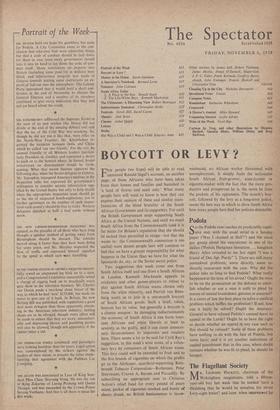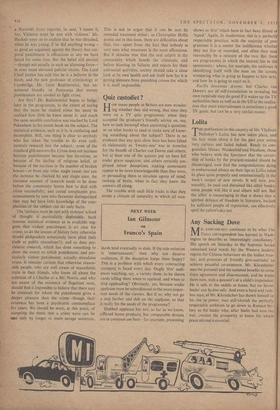The Flagellant Society
MR. LEONARD HACKETT, chairman of Wokingham magistrates, told a fine' year-old boy last week that he needed 'suet th'rishing that he would be senseless for abt forty-eight hours'; and later, when interviewed he n- a ut by a Reynolds News reporter, he said, 'I meant it, too. Violence must be met with violence.' Mr. Hackett went on to explain that he was thrashed, when he was young, if he did anything wrong— as good an arguthent against the theory that cor- poral punishment is efficacious as any we have heard for some time. But the belief still persists --though not usually in such an alarming form— in even more elevated judicial circles. The Lord Chief Justice has said that he is a believer in the birch; and the new professor of criminology at Cambridge, Dr. Leon Radzinowicz, has an- nounced blandly on Panorama that sterner punishments are needed to fight crime.
Are they? Dr. Radzinowicz began to hedge, later in the programme, to the extent of saying that the more he studied crime the more he realised how little he knew about it; and much the same sensible conclusion was reached by Lord Pakenham in his recent book on the subject. The statistical evidence, such as it is, is confusing and incomplete. Still, one thing is clear to anybody who has taken the trouble to do even rudi- mentary research into the subject: none of the standard glib answers fits. Crime does not increase because punishments become less ferocious, or because of the decline of religious belief, or because of the increase in the number of broken homes—or from any other single cause; nor can the increase be checked by any single cure. An immense amount, of research needs to be done before the community learns how to deal with crime successfully; and casual complacent pro- nouncements by men who (however distinguished they may be) have little knowledge of the com- plexities of the sirbject can do only harm.
The 'violence must be met with violence' school of thought is particularly deplorable. Such tenuous statistical evidence as is available sug- gests that violent punishment is no cure for crime; so do the lessons of history (why otherwise should pickpockets notoriously have plied their trade at public executions?); and so does psy- chiatric research, which has done something to show the extent to which punishment, and par- ticularly violent punishment, actually stimulates crime. It remains curious that otherwise reason- able people, who are well aware of masochistic traits in their friends, who know all about the activities of a Charlus or a Mr. Norris, and who are aware of the existence of flagellant sects, should find it impossible to believe that there may be criminals for whom the punishment gives a deeper pleasure than the crime—though their existence has been a psychiatric commonplace for years. We should be wary, at this point, of accepting the thesis that a crime wave can be met only by longer or more savage sentences. This is not to argue that it can be met by remedial treatment either: as Christopher Hollis points out in this issue, there are difficulties about that, too—apart from the fact that nobody is very sure what treatment is the most efficacious. But it remains true that the real culprit is the community which breeds the criminals; and before blaming its failures and rejects for their anti-social activities, society should take a close look at its own health and ask itself how far it is getting pleasure from punishing crimes for which it is itself responsible.







































 Previous page
Previous page